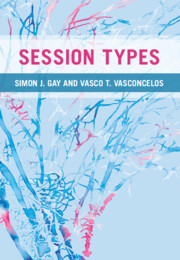9 - Propositions as Sessions
Published online by Cambridge University Press: 12 June 2025
Summary
The theoretical foundation of functional programming is the Curry-Howard correspondence, also known as the propositions as types paradigm. Types in simply typed lambda calculus correspond to propositions in intuitionistic logic: function types correspond to logical implications, and product types correspond to logical conjunctions. Not only that, programs correspond to proofs and computation corresponds to a procedure of cut elimination or proof normalisation in which proofs are progressively simplified. The Curry-Howard view has proved to be robust and general and has been extended to varied and more powerful type systems and logics. In one of these extensions the language is a form of pi calculus and the logic is linear logic, with its propositions interpreted as session types. In this chapter we present this system and its key results.
Keywords
Information
- Type
- Chapter
- Information
- Session Types , pp. 197 - 226Publisher: Cambridge University PressPrint publication year: 2025
